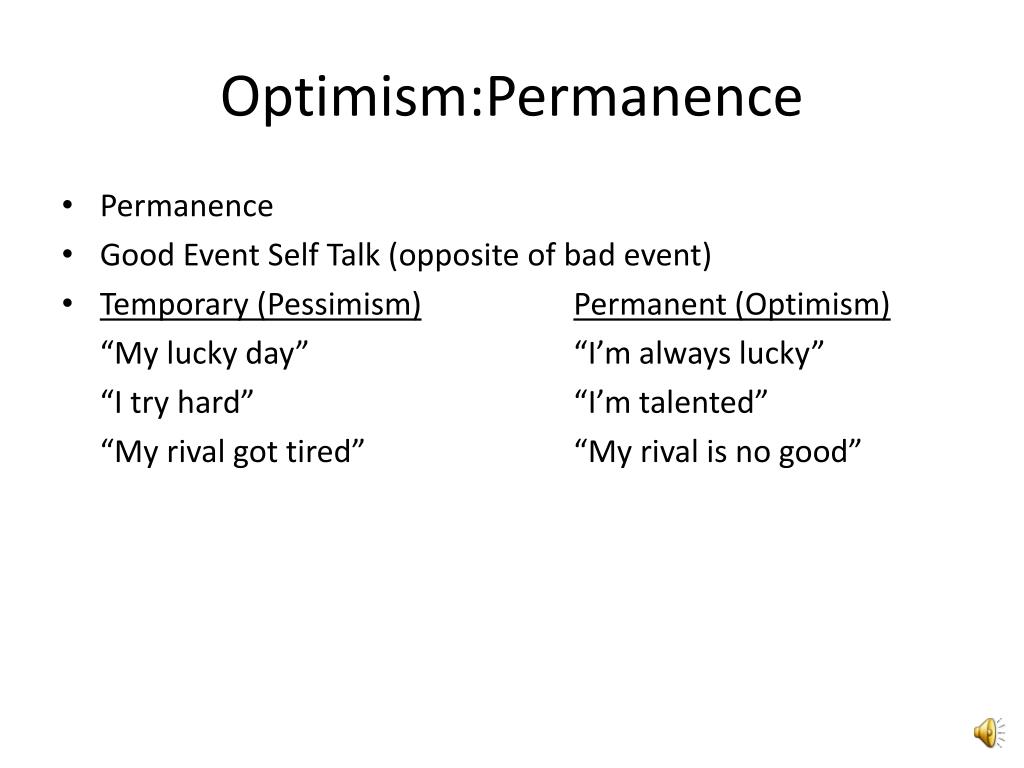
However, it’s possible that this type of character’s tendencies will rub off on the audience and make them try to become more optimistic. Several of those who consider themselves to be optimists make a genuine effort to think positively, so it’s absurd to assume people actually feel and act the way stereotypical optimists do.
#Optimism examples in movies series#
Optimists are also misrepresented in the fact that they are not actually happy every minute of the day, like they are portrayed in many TV series and movies. This is a nice change of pace compared to the constant stereotype of the white woman optimist, but she is still a side character (and a woman) that did not contribute enough to the show to prove to be a tide changer. The writers of the series probably realized they needed a shift in attitudes in the show and decided to make Donna the type of woman who is proud of herself and also certain that her future will be a good one.

Parks and Recreation also stars a black woman, Donna Meagle (played by Retta Sirleaf), whose character wasn’t fully developed until later in the second and third seasons. This may be a setback for our society as a whole, because it may push some people to think optimism is only for happy, white women or even that all white women are happy. Because optimism is a personality trait that is arguably a natural characteristic that many people are born with, it’s ridiculous to assume most optimistic people are Caucasian women. Not only are the optimists in pop culture media being portrayed by a majority of white people, they are also often played by women. The over-excited characters may be a good thing though, because it may push some viewers to become more optimistic themselves. It’s bad for society, as it makes the viewers believe that only white women can be happy and optimistic. This can be a good or a bad thing, depending on the perspective from which it is viewed. What does this mean for real life optimists and the rest of society? Shows and movies like Parks and Recreation often create comedic characters like Leslie Knope, that are stereo-typically over-optimistic about everything to be humorous. Leslie Knope is the kind of character who is so optimistic, she doesn’t worry as severely as others which makes it easier for her to be happier than others.Īmy Poehler as Leslie Knope in Parks and Recreation This type of behavior is a bit extreme, and obviously meant to be humorous. She’s so excited, she says, “I’m so proud of her I could cry,” and then starts crying. Later in the same episode, April (Leslie’s pessimistic assistant) comes to Leslie with an idea to open a dog park. Leslie’s first reaction was excitedly asking him, “Is it a waffle tower?” She’s a character who is always overflowing with emotions, mostly joyful ones. He pulls her away, saying he has a surprise for her. In an episode where Leslie is taken to Washington, D.C., her husband, Ben Wyatt, takes her to see the White House. Bad situations and outcomes still get her down, but she’s fast to recover and look forward to what may happen next. Leslie is a hard working professional, but she blindly follows her optimistic outlook on the world more often than not. As Mark Dawidziak, a critic of the show, described Leslie, “She’s a wide-eyed mid-level Parks and Rec official who, despite her years in local government, has not let politics dampen her sense of optimism,” (Dawidziak, 2009). Leslie Knope works for her small town’s Parks and Recreational department in order to make the town a better place to live. Parks and Recreation is a light-hearted, comedy series whose leading character is the happiest, most optimistic woman you’ll see on television. Psychologists have found that many people must work toward an optimistic nature, and even those who are extremely optimistic will not always be happy (McGowan, 2008). So many optimistic characters just seem to be a little too optimistic, doing and saying things no real person would ever do or say in a similar situation.



But take a second to think of optimistic characters in popular TV shows and movies after researching the optimistic trait, it tends to be blown out of proportion. Considering a good portion of the human population will identify as either pessimists or optimists, it’s inevitable that characters in pop culture media will follow the same pattern.


 0 kommentar(er)
0 kommentar(er)
